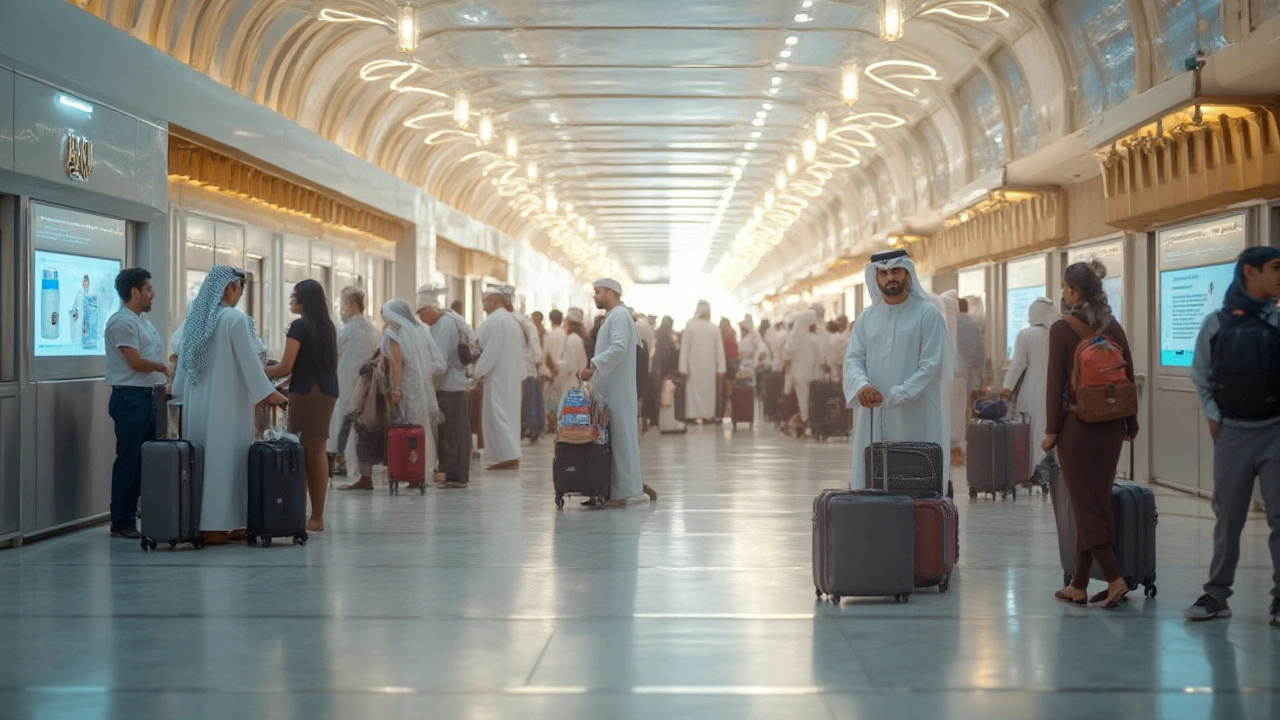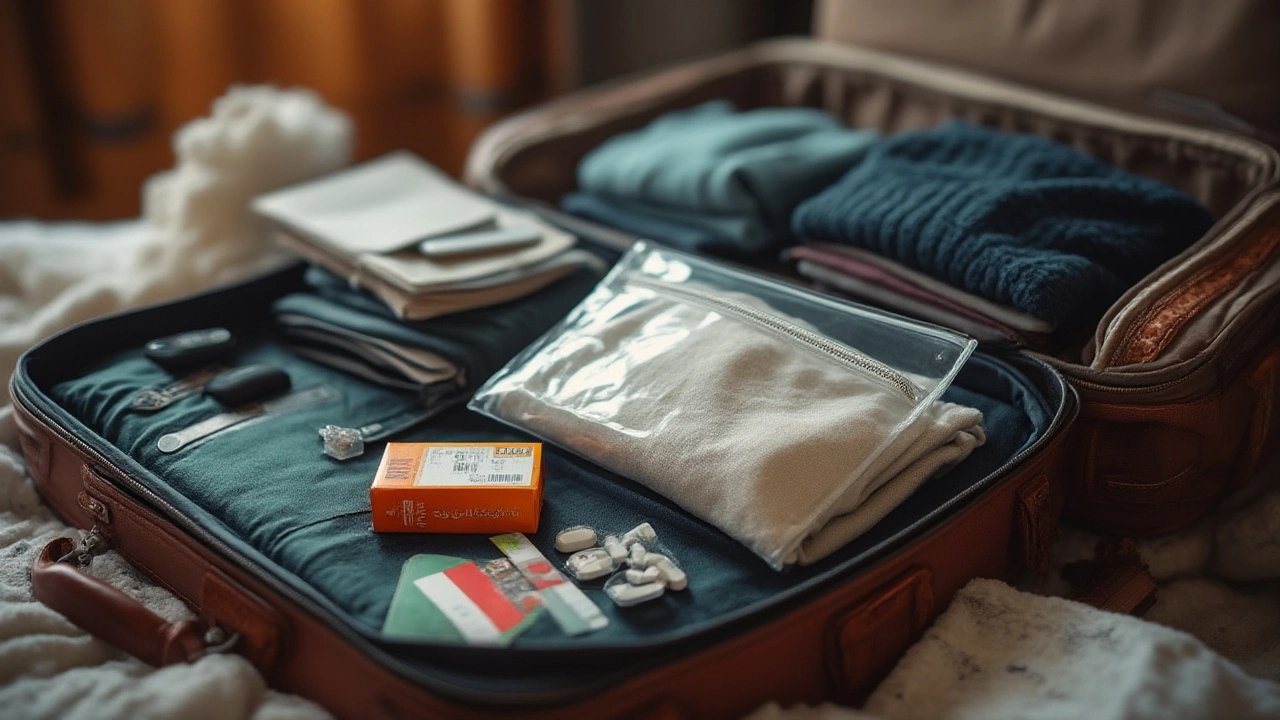
Picture this: you’re packing your suitcase for Dubai, sunglasses in one hand and that battered little pack of Nurofen in the other. Perfectly harmless, right? If you’ve ever heard stories about strict medication laws in the UAE, you might feel your heart drop. The truth is, plenty of travelers panic about what meds will land them in hot water at immigration, especially those basic pills we toss in every bag. Everyone from anxious holidaymakers to business execs has this exact worry once Dubai comes up. So, is ibuprofen really a no-go in Dubai? Let’s cut through the rumors, get to the facts, and make sure you breeze through customs headache-free (literally and metaphorically).
Understanding Dubai’s Medication Laws
Dubai takes its medicine rules seriously. It’s not about banning common tablets for the sake of it—it’s a safety thing. The UAE (that’s the United Arab Emirates) sits at the crossroads of the world, and yes, it absolutely cracks down hard on anything it considers a controlled or dangerous drug at the border. Medications that are prescription-only in the UK or Scotland can be straight-up forbidden there. Other countries hand out codeine and tramadol as casually as cough drops; in the UAE, those are tightly regulated or flat-out illegal. The government’s approach comes from a place of wanting to stop drug abuse and control narcotics, not hassle tourists. But if you don’t know the rules, you can’t plead ignorance at Dubai airport.
First, it helps to know how the UAE splits medication into different classes: controlled, semi-controlled, and regular. Controlled ones are usually strong painkillers, sleeping tablets, anti-anxiety drugs—the stuff that gets abused. Other medicines, including antibiotics, mild pain relief, and basic first-aid things, usually don’t fall under these harsh restrictions. Still, the average traveler gets stuck because not every medicine’s status travels neatly across borders: something as basic as codeine in a cold remedy is innocent enough in Edinburgh but can be a criminal offense in Dubai.
Dubai’s official rules actually get updated often. In 2024, the UAE Ministry of Health and Prevention published a new list, clarifying what’s forbidden and what needs permission. The best place to see the latest? Their official website (it changes all the time—Google it before you pack, trust me). Being totally transparent about what you’re bringing is always the safest bet, because security and customs staff are trained to spot anything they aren’t sure about. You don’t want to be the one stuck in arrivals for bringing a random painkiller you forgot at the bottom of your backpack.
Is Ibuprofen Banned or Restricted in Dubai?
Here’s where everyone’s shoulders relax: ibuprofen is not on Dubai’s banned or controlled medications list for travelers. It’s considered a basic, over-the-counter painkiller—think paracetamol, Panadol, aspirin—none of these will land you in trouble. Pharmacies in Dubai sell it openly (usually under common brand names like Nurofen, Advil, and Brufen), and locals buy it for headaches, muscle pain, and fevers just like anywhere else. If you travel with a small pack, it won’t cause trouble at the airport, and you don’t need a prescription in most situations.
There are a handful of important things to remember, though. It can never hurt to travel with the medication in its original box or blister pack. Anything loose in a ziplock bag, without the labeled packaging, can look suspicious if customs decides to check. And if you bring a massive, industrial-sized tub, that might draw attention. Keep quantities reasonable—a strip or two, not a year’s supply.
Ibuprofen gels and creams are treated the same way, although weirdly enough, liquids of any kind in hand luggage at Dubai airport need to stick to the standard 100ml rule. Just like shampoo and perfume, really. Also, never assume that every combination medicine is as innocent as the regular stuff. Some cold and flu tablets in the UK have codeine, which is a total no-go in the UAE without a doctor’s letter. Always double-check ingredients if you’re unsure—and check the box or insert because brands mix things up all the time.
Doubtful? Here’s a quick rundown of household painkillers and their Dubai status:
- Ibuprofen (Nurofen, Brufen, Advil): Permitted, over-the-counter.
- Paracetamol (Panadol, Tylenol): Permitted, over-the-counter.
- Aspirin: Permitted, over-the-counter.
- Codeine (Solpadeine, some migrane meds): Controlled—prescription and official paperwork required.
- Tramadol and morphine: Strictly banned unless you have a UAE prescription with pre-approval before travel.
So unless you’re bringing something super strong or prescription-based, a standard ibuprofen packet is no issue.
What About Prescription Ibuprofen or Special Needs?
Bog-standard high street ibuprofen (like 200mg) is fine. But what if yours is prescription strength (think 800mg)? Technically, prescription or high-dose ibuprofen isn’t controlled, but it’s always wise to carry a copy of your prescription if you need it for a medical reason. Dubai’s customs and health officers do occasionally ask for clarity with high-strength medication, especially if it looks like a lot. If you use ibuprofen for chronic pain, post-op recovery, or arthritis, a doctor’s letter explaining why you carry it makes things easy at the border.
Any medication that’s not for personal use—like extra packs for friends—will raise red flags and potentially get confiscated. UAE authorities make a sharp distinction between personal use (enough for the time you’re there, maybe an extra strip for emergencies) and quantities they see as suspicious. Multiple boxes or packets? You better have a very good medical explanation, in writing, from your doctor.
And if you need liquid ibuprofen (for kids, for example), always keep it sealed in its original bottle, and stick to the rules about how much liquid you can carry in your hand luggage. Dubai’s airport security is super strict about those clear plastic bags and 100ml limits for liquids. Don’t risk it with a half-empty, unlabelled bottle—security staff have zero chill about things that look odd in an X-ray.

Best Practices for Packing Medication for Dubai Trips
Now for the helpful bit: here’s what to do when packing up your ibuprofen (or any medicine) for a Dubai trip. This is experience talking, and trust me, skipping a step can mean losing your tablets to airport security or, even worse, having to have a tense conversation at customs.
- Pack all meds in your hand luggage, not your checked suitcase. Bags get lost, and you don’t want to be without what you need, even for a day.
- Keep original packaging: Boxes, blister packs, and prescription labels help customs officers know your pills are legit.
- Don’t mix pills together. Loose pills in one bottle look sketchy and make it impossible to identify what’s what.
- If you have prescription meds or anything even slightly ‘strong’, keep a copy of your doctor’s letter and prescription, translated into English or Arabic if possible.
- Traveling with kids? Liquid medicines must fit inside your clear plastic hand-luggage bag, bottles should be under 100ml, and always keep them sealed and labelled.
- Only bring what you realistically need. Hoarding dozens of strips is a red flag for customs anywhere, especially in the UAE.
- Look up the UAE Ministry of Health webpage for the latest list of restricted drugs before flying—rules can and do change every year.
If you need to bring controlled medication, such as codeine or strong painkillers, you MUST apply for permission before you travel. There’s a web portal (Google 'UAE permit for controlled medication') where you upload your details and prescription. It takes a couple of weeks to process, so don’t leave it to the last minute.
Below is a handy table with types of medication, the most common UK brand names, and their legal status when entering Dubai in 2025:
| Medication | Common UK Brand | Legal Status in Dubai |
|---|---|---|
| Ibuprofen | Nurofen, Advil, Brufen | Allowed (no prescription needed) |
| Paracetamol | Panadol, Tylenol | Allowed |
| Aspirin | Bayer, Disprin | Allowed |
| Codeine | Solpadeine, Nurofen Plus | Controlled, paperwork needed |
| Tramadol/Morphine | Various | Banned without UAE prescription |
| Diphenhydramine (Nytol-type) | Nytol | Allowed if in small quantities |
What Happens If You Get Stopped at Dubai Airport?
You’ve landed, shuffled through a long customs queue, and suddenly, the X-ray machine lights up. Security officers can and do pull aside suitcases that show up with lots of unlabelled tablets. Don’t panic if this happens—Dubai authorities are used to cautious tourists asking about their medication. Most of the time, a quick check of the box or prescription, a minute’s conversation, and you’re through.
If you’re missing boxes, or have medication that’s forbidden (like codeine without a letter), expect them to confiscate it on the spot and, in rare cases, ask you for a signed statement. If it’s a seriously controlled substance, or large amounts of strong painkillers, police or airport health professionals can investigate further. Worst-case scenario? Legal problems or being sent home on the next plane. This is super rare with basic medicines like ibuprofen, but with anything borderline, the UAE is not a country that’s lax about rules.
One surprisingly helpful thing: medical staff are available at Dubai airports to talk over anything complicated. They’ll check your paperwork, look up the medicine in their system, and usually err on the side of caution for legal (not medical) reasons. If you lose your medicine this way, you can often get replacement over-the-counter pills from the airport pharmacy after you leave customs, though it might cost a bit more than at home.
If you ever worry, you can print off the official Dubai customs guidelines, or download the UAE Ministry of Health app, which lists the up-to-date status of basically every medicine a tourist would need. Don’t rely on random internet forums—rules get updated almost every year.
Additional Tips: Staying Safe, Healthy, and Legal
The biggest lifesaver? Know what’s in your meds before you leave. Some cold and flu meds, sleep aids, and even travel sickness pills contain ingredients that are fine in the UK but restricted in Dubai. Always check!
If you run out, Dubai isn’t some medicine desert. Chain pharmacies like Boots, Aster, and Life Pharmacy are everywhere in shopping malls, airports, even petrol stations. Prices are usually similar to the UK, and staff are used to helping tourists. If you need something prescription-only, you’ll need to see a local doctor. Most major hotels are linked to medical clinics that can arrange an appointment for you in a couple of hours.
- Keep a digital photo of your prescription and a list of allergies or medical needs on your phone, just in case you lose your paperwork.
- Check airline regulations as well—some carriers are stricter about liquids and tablets in the cabin.
- If you’re transiting through another country on your way, check their rules. Qatar and Saudi Arabia have slightly different lists.
- Try not to rely on pills from home for common complaints like headaches or sunburn—Dubai’s pharmacies stock all the basics, and local remedies are often milder and cheaper!
- If you’re ever in doubt, talk to your doctor or pharmacist before flying. Many are totally up to date on the UAE’s latest medicine lists.
The short version: bringing ibuprofen to Dubai is completely fine as long as it’s for personal use and in its original packaging. Don’t mix it with controlled drugs, don’t pack mountains of it, and don’t try to sneak in codeine or prescription meds without doing your homework. As long as you respect the UAE’s rules, you’ll get to enjoy your trip headache-free.
Dubai Escort